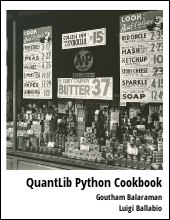Using SQLAlchemy in Luigi Workflow Pipeline
February 05, 2015 by Gouthaman BalaramanThis is a very basic example on using Luigi sqla contrib module in a task pipeline while using luigi
The luigi.contrib.sqla provides support for SQLAlchmey through the SQLAlchemyTarget for storing in databases supported by SQLAlchemy. The user would be responsible for installing the required database driver to connect using SQLAlchemy.
Minimal example of a job to copy data to database using SQLAlchemy is as shown below:
from sqlalchemy import String
import luigi
from luigi.contrib import sqla
class SQLATask(sqla.CopyToTable):
# columns defines the table schema, with each element corresponding
# to a column in the format (args, kwargs) which will be sent to
# the sqlalchemy.Column(*args, **kwargs)
columns = [
(["item", String(64)], {"primary_key": True}),
(["property", String(64)], {})
]
connection_string = "sqlite://" # in memory SQLite database
table = "item_property" # name of the table to store data
def rows(self):
for row in [("item1" "property1"), ("item2", "property2")]:
yield row
if __name__ == '__main__':
task = SQLATask()
luigi.build([task], local_scheduler=True)
If the target table where the data needs to be copied already exists, then the column schema definition can be skipped and instead the reflect flag can be set as True. Here is a modified version of the above example:
from sqlalchemy import String
import luigi
from luigi.contrib import sqla
class SQLATask(sqla.CopyToTable):
# If database table is already created, then the schema can be loaded
# by setting the reflect flag to True
reflect = True
connection_string = "sqlite://" # in memory SQLite database
table = "item_property" # name of the table to store data
def rows(self):
for row in [("item1" "property1"), ("item2", "property2")]:
yield row
if __name__ == '__main__':
task = SQLATask()
luigi.build([task], local_scheduler=True)
In the above examples, the data that needs to be copied was directly provided by overriding the rows method. Alternately, if the data comes from another task, the modified example would look as shown below:
from sqlalchemy import String
import luigi
from luigi.contrib import sqla
from luigi.mock import MockFile
class BaseTask(luigi.Task):
def output(self):
return MockFile("BaseTask")
def run(self):
out = self.output().open("w")
TASK_LIST = ["item%d\tproperty%d\n" % (i, i) for i in range(10)]
for task in TASK_LIST:
out.write(task)
out.close()
class SQLATask(sqla.CopyToTable):
# columns defines the table schema, with each element corresponding
# to a column in the format (args, kwargs) which will be sent to
# the sqlalchemy.Column(*args, **kwargs)
columns = [
(["item", String(64)], {"primary_key": True}),
(["property", String(64)], {})
]
connection_string = "sqlite://" # in memory SQLite database
table = "item_property" # name of the table to store data
def requires(self):
return BaseTask()
if __name__ == '__main__':
task1, task2 = SQLATask(), BaseTask()
luigi.build([task1, task2], local_scheduler=True)
In the above example, the output from BaseTask is copied into the database. Here we did not have to implement the rows method because by default rows implementation assumes every line is a row with column values separated by a tab. One can define column_separator option for the task if the values are say comma separated instead of tab separated.
The other option to sqla.CopyToTable that can be of help with performance aspect is the chunk_size. The default is 5000. This is the number of rows that will be inserted in a transaction at a time. Depending on the size of the inserts, this value can be tuned for performance.
Programming Python Luigi SQLAlchemy
Related Post
- QuantLib Python CookBook Is Almost Done
- Building Task Pipelines Using Luigi
- Sending MSMQ Messages Using Python
- Running ZEO as a Windows Service
- Multi-Processing With Pandas

I am Goutham Balaraman, and I explore topics in quantitative finance, programming, and data science. You can follow me @gsbalaraman.

Updated posts from this blog and transcripts of Luigi's screencasts on YouTube is compiled into QuantLib Python Cookbook .